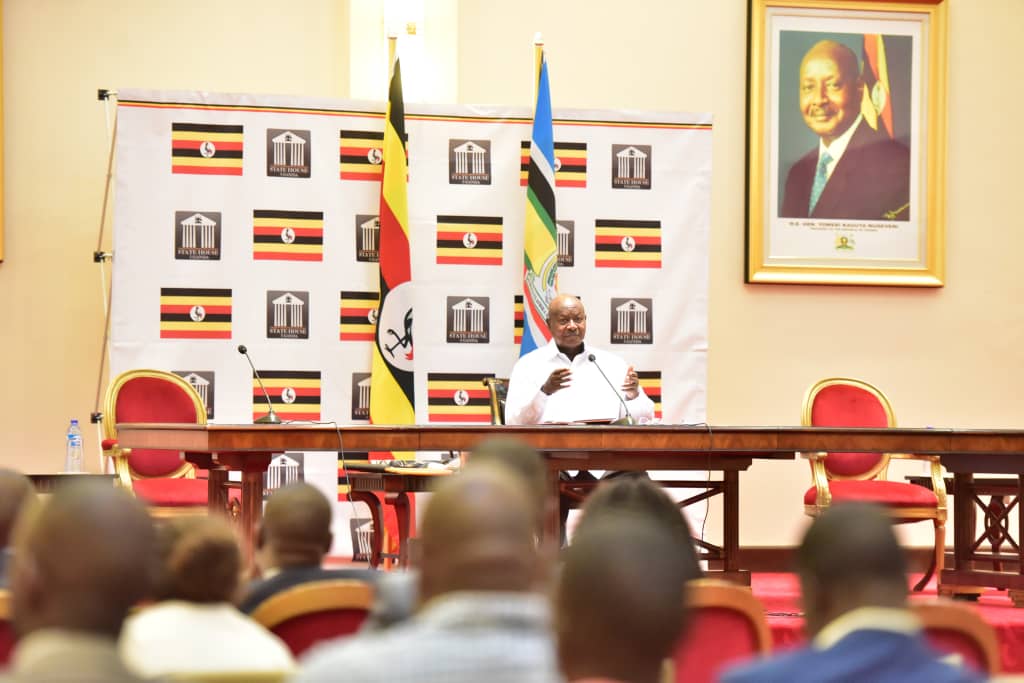President Yoweri Museveni has lashed out at foreign countries especially the U.S who continue to meddle into the political affairs of Uganda, including the funding of opposition activities.
Museveni said that this was morally wrong because a foreigner can not puport to understand the internal problems of a particular country more than the indigenes (citizens).
The President said this on Sunday while addressing the country on the successes and the progress towards transforming the country.
“Interfering in the internal affairs of other countries is morally and practically wrong,” said Museveni.
“What superior intelligence do you have to think that you can understand the problem in my house better than we the occupants?” wondered Museveni.
He said that there is an ongoing campaign by the opposition political actors in Uganda who get foreign funding to spread pessimism that Uganda is a failed state.
He cited the example of Non Governmental Organizations (NGOs) in Uganda many of which receive funding from foreign countries to campaign for human rights and to criticize government.
The same foreign funding, he said, was being used to pay desperate youths in Uganda to burn tyres during riots as well as set petrol stations ablaze to project the idea that Kampala was burning.
To explain his discontent regarding this foreign interference, Museveni used the allegations by some elements in the U.S that Russia hacked some computer systems during the recent Presidential election in America to fish for some information that Donald Trump would use to win Democratic candidate Hillary Clinton.
Trump has since his assumption of office as President undergone intense scrutiny with an ongoing probe. In fact some have proposed that Trump faces impeachment if it is discovered that he indeed colluded with Russia to meddle into an American election.
Museveni wondered how mere acquisition of information would be a grave offence but supporting and funding anti-government activities in Uganda by U.S wasn’t viewed in the same prism.
“In Africa, NGOs funded by foreign Governments, actually give money to opposition players, give advice, lie on their behalf etc. These foreigners may think that Africans are weak and foolish,” he said.
“When foreigners were chased from Vietnam, it is now one of the fastest growing economies in the World. What was the justification for foreigners making so much chaos about something they did not understand? Besides, what is good for the goose is good for the gander”.
Museveni said that Article 1 of the Supreme law of Uganda stipulates that power belongs to the people of Uganda, and that external forces ought to respect this. Unless Uganda needs to amend this article to empower NGOs and foreigners, he joked.
“We may have to enact the Sovereignty Act where citizens who helped foreigners to interfere in our politics would attract appropriate legal sanctions”.
He advised foreign backed NGOs to instead relocate to countries like DRC, Syria and Iraq where there are actual problems and “people are dying like flies”.
His criticism did not spare the foreign press including CNN either, whom he accused of unbalanced reporting.
“The media both local and foreign have been reporting in a mendacious and tendentious manner. You are shouting NRM is useless. You need to be careful”.
He also took a swipe at development partners like World Bank who instead of supporting government to develop infrastructure, have put their primary focus on gay and women’s rights.
“Unfortunately, they never bother with the basics of the pre-capitalist economies – items like the railway, electricity etc. Instead they spend much time talking of social issues – women’s rights, homosexual rights, education.. But even homosexuals need electricity and good transport”.
Museveni’s comments on foreign interference follow weeks of international condemnation of the Ugandan government which was prompted by the allegations of torture by MPs including Robert Kyagulanyi (Bobi Wine).
The arrest, military detention as well as alleged torture of Bobi Wine attracted an outburst from international rights campaigners as well as political players including Congressmen in the U.S who mounted pressure on Uganda to release him.










